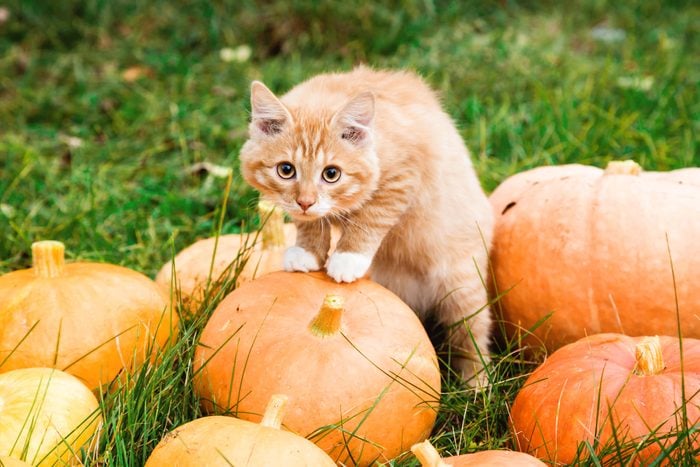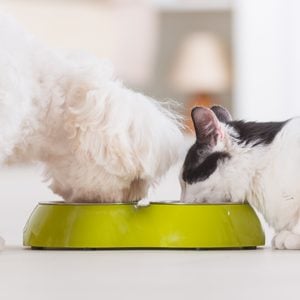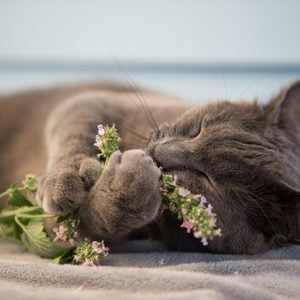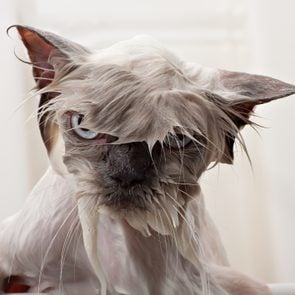Can Cats Eat Pumpkin? Vets Explain the Pros and Cons of This Tasty Fall Treat
Updated: Jan. 25, 2024

Leaves are falling, temps are dropping and you’re ringing in the season with the most quintessential of fall treats, a pumpkin spice latte. But as you watch your favorite furball eyeing the whipped cream on your drink, you might be wondering if you can dole out some of the seasonal goodness to your kitty. But can cats eat pumpkin?
Although that frothy Starbucks concoction should definitely be off limits, including some pumpkin in your cat’s diet might actually be a good idea. Of course, there’s a wide variety of pumpkin out there—from canned pumpkin and pumpkin pie to that fresh pumpkin you’re about to turn into a jack-o’-lantern. Is some of it toxic to cats, or does everything get a vet’s seal of approval? We consulted Leslie Sinn, DVM, a veterinarian and cat behaviorist, about whether you can safely share fall’s favorite flavor with your cat.
Get Reader’s Digest’s Read Up newsletter for more pets, humor, cleaning, travel, tech and fun facts all week long.
Do cats like pumpkin?
They do! Although cats are obligate carnivores—meaning they have to eat meat in order to survive—they definitely find pumpkin appealing as well. “Maybe it’s the taste, or maybe it’s the creamy texture,” says Dr. Sinn. “We’re pretty clueless as to why, but most of them do seem to really like it. And cats are pretty particular about the foods they eat, so it is kind of surprising.”
Can cats eat pumpkin?
Yes—as long as it’s pure pumpkin. “It needs to be pure cooked pumpkin puree,” says Dr. Sinn. “People sometimes get confused and buy a can of pumpkin-pie filling, which has sugar and spices and other additives in it.” That can be problematic from a health perspective. (More on that below.) But again, as long as you’re careful about the type of pumpkin you’re buying, it’s OK to give it to your cat—and even good for them! This is different from milk, which you actually shouldn’t give your cat, believe it or not.
What are the benefits of pumpkin for cats?
Like other vegetables, pumpkins are high in fiber and chock-full of vitamins. And because they’re about 90% water, they’re low-calorie too—all of which means there are plenty of good reasons to share this colorful fruit with your favorite feline.
It’s packed with nutrients
A member of the squash family, pumpkin is high in potassium, phosphorus and calcium, as well as a plethora of vitamins that help cats maintain strong bones, shiny coats and a healthy immune system. “Pumpkins have vitamins A, D, E and K,” says Dr. Sinn. “So they’re pretty nutritious.”
It helps with kitty constipation
In the wild, cats eat grass to help keep their digestive systems moving. Because of its high-water and high-fiber content, pumpkin can achieve the same goal. “Because cats like it, pumpkin is often a first line of defense in terms of helping cats that are constipated,” says Dr. Sinn. “It provides water and bulk in their stool to help relieve the constipation.”
It’s a natural hairball remedy
The fiber in pumpkin can also help cats that struggle with hairballs. “It works fairly well to help cats that have hair getting caught up in their GI tract,” says Dr. Sinn. “The pumpkin will smooth that through and help them pass the hair.”
And because most cats will willingly eat pumpkin off their plates, many vets prefer it to hairball-control gels or other medications. “Cats seem to like the taste better than hairball remedies,” adds Dr. Sinn, “which is why we tend to try that first.”
It can aid in weight loss
If your vet has suggested you put your cat on a diet, pumpkin can help there too. Adding a teaspoon or two of pumpkin to your cat’s food every day can help them feel fuller while eating fewer calories. “Because it’s got a lot of fiber in it, the pumpkin will help fill up the cat, so they aren’t so whiny at mealtime,” adds Dr. Sinn. “You just want to make sure that the cat is still getting enough of its regular food so it is meeting its nutritional needs. And you don’t want to give so much pumpkin that they wind up having loose stool or diarrhea.”
Is pumpkin a natural de-wormer?
No. Although some social media posts have claimed that pumpkin seeds can kill worms and other parasites in pets, Dr. Sinn says she’s “never seen any scientific evidence that indicates pumpkin can eliminate parasites from the GI tract. If your cat has worms, you need something more than pumpkin.” Consider that internet cat “fact” debunked.
What kinds of pumpkin can a cat eat?
You can find pumpkin in the produce aisle at the supermarket or with the canned vegetables. It’s also frequently sold as ready-to-bake pie filling, and its seeds are popular as a healthy snack. But not all pumpkin products are good for your cat. Here’s what you need to know.
Canned pumpkin
Canned pumpkin puree is the best kind of pumpkin to give a cat. “The main thing about cooked pumpkin is that the cooking process breaks down the fiber somewhat, so it’s not so overwhelming for their digestive tract,” says Dr. Sinn. It’s also what gives pumpkin the smooth, creamy texture cats seem to like. Just make sure the can you’re buying says it is 100% pumpkin. The ones labeled “pumpkin pie filling” contain sugar and a variety of spices that are not healthy for cats.
Fresh pumpkin
You can also purchase an actual pumpkin and cook it yourself. Pie pumpkins, also known as sugar pumpkins, tend to be smaller, denser and sweeter than carving pumpkins, and their flesh is less stringy, but both kinds are used for baking. To prepare, cut the pumpkin in half, remove the seeds and guts, and then roast in the oven until the flesh is soft (about 45 minutes in a 350-degree oven). Let the pumpkin cool, and then scoop out the flesh and puree it in a blender. Don’t add oil or spices, which can be harmful to cats.
Raw pumpkin is also OK for a cat to eat, though your kitty probably won’t see that jack-o’-lantern on your porch as food. The vegetable’s tough rind and stem would be difficult for a cat to chew, but it wouldn’t present any real danger to them. “Some cats will chew on anything, but I can’t envision a cat actually eating that,” says Dr. Sinn.
Pumpkin seeds
Pumpkin seeds, sometimes called pepitas and sold raw or roasted, would be safe for cats too. “They’re certainly not toxic,” says Dr. Sinn. “I just don’t think most cats would have much of an interest.” Of course, pumpkin seeds, like other seeds, could present a choking hazard to pets. So if your cat is interested in these seeds, it’s better to crush them before offering them to your cat.
What kinds of pumpkin should cats avoid?
Just because pure pumpkin is good for a cat, it doesn’t mean that everything pumpkin flavored is cat-friendly. Obviously that pumpkin spice latte is off limits, but you should also keep your cat away from high-fat, high-sugar pumpkin desserts, including pumpkin pie and pumpkin muffins.
“Getting a single round of pumpkin pie probably won’t be a big issue for a cat, but it’s not a good idea,” says Dr. Sinn. “Many cats are prone to being overweight, so they don’t need the sugar in it.” Sugary pumpkin-flavored treats can also pose a problem for cats with diabetes and chronic gastrointestinal diseases like IBD (inflammatory bowel disorder).
Pumpkin-based baked goods also frequently contain spices like cinnamon and nutmeg. While they’re harmless to cats in small amounts, they could be dangerous if ingested in larger quantities (about a teaspoon or more of the pure spice). So while it’s very unlikely a cat would get a toxic amount of either spice from a pastry or pie, “it’s best to steer away from it,” says Dr. Sinn.
How much pumpkin is too much for a cat?
Most cats will tolerate up to about 2 tablespoons of pumpkin a day. After that, you run the risk of loose stool and diarrhea. Whether you’re giving pumpkin to your cat as a treat or to help with digestion, the general rule of thumb is to start small. “We usually tell people to start out with about 1 tablespoon a day and see how the cat does,” says Dr. Sinn. “By that I mean, observe their stool and make sure it’s not too soft or too hard. If the cat is still having hard stool, you can go up to about 2 tablespoons a day. Most cats will tolerate that well.”
Should certain cats avoid pumpkin altogether?
Even cats with chronic health conditions can benefit from a little pumpkin in their diets. “It’s not contraindicated with any underlying health issue or health problem,” says Dr. Sinn. “Many of the health issues cats have are associated with not having enough fiber in their diet, so pumpkins should be a positive in that regard. For example, for cats with diabetes, often their diabetes is easier to control if they’re on a high-fiber diet.”
What should you do if your cat has eaten too much pumpkin?
Well, first, don’t panic: Even large amounts of pumpkin won’t be toxic. “Mainly be prepared for what’s going to come out the other end,” says Dr. Sinn. “The worst-case scenario is that the cat will develop diarrhea and you’re going to have to wait for him to pass all the pumpkin he ingested in order for things to start firming up again. That’s going to take 48 hours or so.”
While it’s always a good idea to check in with your vet and let him or her know what’s going on, the situation will likely resolve itself with time. “If the diarrhea hasn’t resolved in 24 to 48 hours, then definitely seek veterinary help,” adds Dr. Sinn. “But mainly, you’re just waiting for things to firm up again once the pumpkin passes through.”
About the expert
- Leslie Sinn, DVM, is a veterinarian and the founder of Behavior Solutions for Pets in Ashburn, Virginia. She is also a diplomate of the American College of Veterinary Behaviorists.



